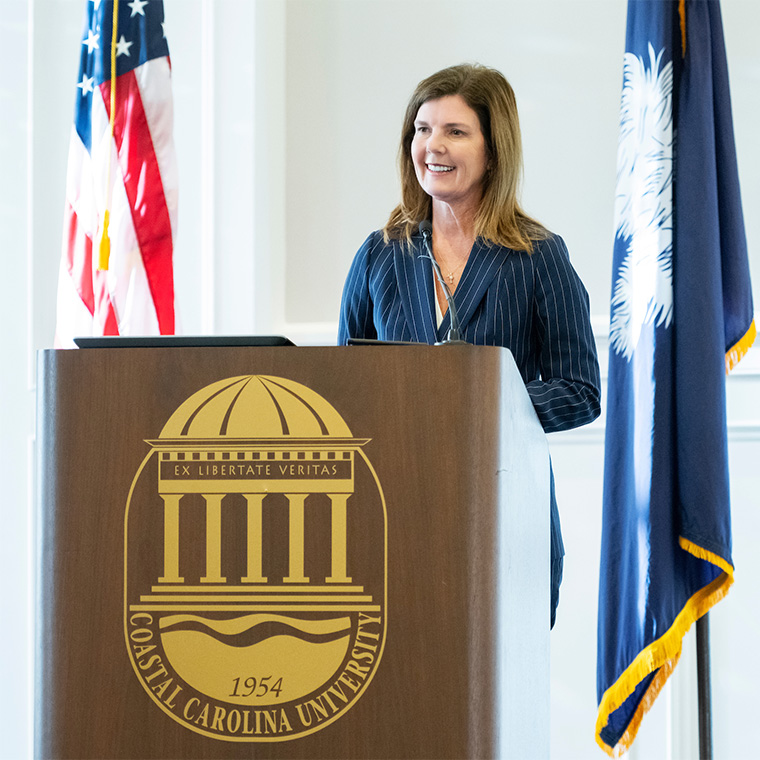CCU’s College of Graduate and Continuing Studies hosts South Carolina Lt. Gov. Pamela Evette to discuss workforce development, providing pathways to higher education
“In South Carolina, we’ve been very focused on creating the workforce of tomorrow, making sure that the world-class companies that are coming here to our state have the workforce that they need,” said Evette. “Thank you to Coastal for making sure that they’ve looked at all the pathways for getting our population skilled up and trained up for the opportunities that are before them. When you give multiple pathways to advanced education to the people of Horry County and all around this general area, you’re giving them hope for a brighter tomorrow. When you give people hope, opportunities become endless.”
Evette said workforce development is something she is very passionate about. She shared that Gov. Henry McMaster worked along with the general assembly to request $75 million to make sure workforce scholarships could be delivered in South Carolina.
During the last two years, the University has developed outreach programs for adult learners and transfer students to improve access to higher education, leading to a better-prepared workforce. Those initiatives in workforce development include market/industry responsive online and in-person undergraduate and graduate degrees, completion degree programs, non-credit and for-credit continuing and professional education certificate programs, industry certifications, customized corporate workforce development partnerships, continuing education units for various professions, and transfer and articulation agreements.
Earlier this year, the University began offering CCU Complete – a tuition incentive program for South Carolinians who have earned some college credit but not completed a four-year degree. The program allows eligible students to take up to five online courses in one semester for $100 each. To learn more about CCU Complete, including specific eligibility requirements and how to apply, visit coastal.edu/complete.
J. Lee Brown, dean of CCU’s College of Graduate and Continuing Studies, said the college has seen a significant increase in adult enrollment, with increases in transfer and graduate students since 2022. Providing flexibility and convenient options for degree completion, as well as lowering financial barriers, has been a priority for the college.
“We’re hearing on a daily basis from all of the key stakeholders: employers, economic development agencies, governmental agencies, etc., that there is a significant need to improve and grow the workforce through higher education credentials, and we see it in the data,” Brown said. “We had a wonderful meeting with Lt. Gov. Evette to talk about how the programs that we’ve started at Coastal Carolina University during the past two years – we’re reaching out to transfer students, adult learners, the underemployed – are creating pathways to improve and increase access not just to four-year degrees but to innovative, industry-relevant higher education credentials.”
Brown said that while Horry County is the fastest growing county in South Carolina, the Waccamaw Region underperforms the state in degree attainment and is even worse when compared to the national rate. According to the most recent U.S. Census data, 24.3% of adults 25 years and older in Horry County have a baccalaureate degree, while in South Carolina that figure is 29.6%. The national average is 39%. The South Carolina Department of Commerce reports that for Georgetown, Horry, and Williamsburg counties, only 15% of adults aged 18 to 64, the prime contributors to the workforce, have a baccalaureate degree.




